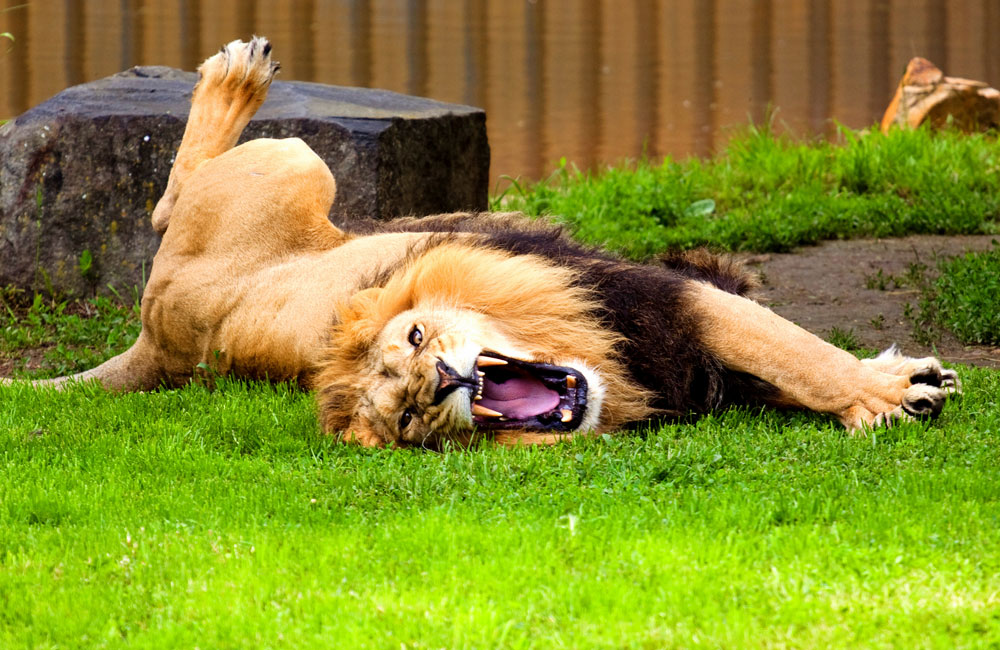
Lion 'Factory Farms,' and the Dark Side of Wildlife Tourism (Op-Ed)

Nicole Paquette is vice president of wildlife protection at The Humane Society of the United States (HSUS). She contributed this article to Live Science's Expert Voices: Op-Ed & Insights.
As global outrage continues to grow over the death of Cecil, a beloved lion who was mercilessly killed outside Hwange National Park in Zimbabwe, conversations have begun about the broader issue of trophy hunting and the role Americans play in it.
Thousands of African lions are slaughtered every year, and the United States is the world's largest importer of lion parts from hunting trophies. Although almost every major media outlet has covered Cecil's tragic death, only a few have touched on the even darker side of Africa's pay-to-play hunting industry: canned hunting, where tame lions and other wildlife are bred for the bullet and released into fenced enclosures to be shot for easy trophies.
Captive breeding of lions is a big business in South Africa, where opportunities for visitors to interact with adorable lion cubs abound. However, well-meaning tourists who pose for photos with the cubs have no idea of the damaging industry their funds are supporting. Akin to factory farming, lionesses are overbred, and their cubs are taken away right after birth.
When the cubs have outgrown their value to be used as photo props, they're sold to canned hunts for wealthy clients to shoot. A new documentary that premiered this month, "Blood Lions," takes a hard look at the industry and exposes the sham of South African cub-petting facilities and their connection to canned hunts.
Shockingly, this horrific practice is not unique to South Africa — in fact, it's estimated that there are thousands of canned, or "captive," hunting facilities throughout the United States, with approximately half of them in Texas. Although canned hunts in the United States don't offer lion on their lists of wildlife available to shoot, there are plenty of other animals to choose from, as long as the customer is willing to dish out the hefty fee. Price tags can range from a couple thousand dollars to kill an exotic sheep to an astonishing $50,000 for a cape buffalo at the 777 Ranch in Texas. Animals offered at these types of facilities typically come from private breeders and animal dealers. Like Cecil, who had grown accustomed to tourists, animals on canned hunts often spend their entire lives around people and have lost their natural fear of humans, making them even easier targets.
Although Cecil was not killed in a canned hunt, the methods his killers used lack the same principles of sportsmanship. Cecil's killers used the carcass of another dead animal to bait the famous lion, and used a spotlight at night to set up an easy shot — two practices frequently exposed for lacking the critical element of fair chase. [Cecil the Lion: Do Paid Hunting Permits Help Save Wildlife?]
Sign up for the Live Science daily newsletter now
Get the world’s most fascinating discoveries delivered straight to your inbox.

Our investigation on captive hunting revealed animals so tame that investigators were able to walk up and pet them. One ranch operator was able to hand-feed a kangaroo that he declared had "a bounty on his head," and even admitted to drugging his animals.
The fight over captive hunts in the United States has been ongoing for decades, and approximately half of the states currently have a full or partial ban on the practice. Despite strong opposition to the practice from both animal-protection and ethical-hunting groups, those who profit from this shameful activity continue to lobby lawmakers to expand their industry.
The good news is that there's much that can be done to fight this egregious practice — both in the United States and abroad. If captive hunting is legal in your state, contact your elected state lawmakers and ask them to introduce or support legislation prohibiting this activity. If it's not allowed, urge them to fight against any attempts to legalize it.
The U.S. Fish and Wildlife Service has proposed listing lions as threatened under the Endangered Species Act. Please urge the agency to finalize this rule and afford much-needed protections to this vulnerable species.
Follow all of the Expert Voices issues and debates — and become part of the discussion — on Facebook, Twitter and Google+. The views expressed are those of the author and do not necessarily reflect the views of the publisher. This version of the article was originally published on Live Science.









